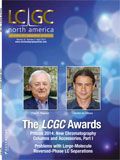Peaks of Interest
Gerard Rozing has been announced as the winner of the second annual Uwe D. Neue Award in Separation Science.
Gerard Rozing Wins 2014 Uwe D. Neue Award
Gerard Rozing has been announced as the winner of the second annual Uwe D. Neue Award in Separation Science. The award was created by Waters Corporation (Milford, Massachusetts) to recognize the work of distinguished industrial scientists, in honor of Uwe D. Neue, the late scientist and Waters Corporate Fellow. Rozing will receive the award at the upcoming 41st International Symposium on High Performance Liquid Phase Separations and Related Techniques (HPLC 2014) held on May 11–15 in New Orleans, Louisiana.
Rozing is widely known and recognized as an outstanding researcher for his work that bridges fundamental science with technical solutions in a commercial environment. He worked in industry for more than 30 years, before retiring in 2012 to become a consultant for Agilent Technologies (Santa Clara, California) and other organizations. He has authored more than 57 publications and holds six US patents. Rozing also recently devised and presented a successful series of educational webinars on fundamentals, optimization, and practical aspects of UHPLC for LCGC.
In a statement on his personal webpage, Rozing said "It is always a great honor to become recognized through an award. But I feel deeply honored by this award since it is named after Dr. Uwe Neue, a contemporary peer with whom I shared a common career pathway in many aspects. I met Uwe the first time some 25 years ago during one of the HPLC symposium series and many times since then. Our encounters were always easy, since we had common roots in Germany. I have been impressed with his ability to maintain his scientific integrity in a for-profit-organization environment where unlike in academia, the science has to compromise with engineering, marketing, finance, sales, and manufacturing functions."
Gerstel Forms OEM Agreement with Spark Holland
Gerstel GmbH & Co. KG (Mülheim an der Ruhr, Germany) and Spark Holland (Emmen, The Netherlands) have announced an original equipment manufacturer (OEM) agreement. The agreement will allow Gerstel to develop and market fully integrated automated dried blood spot (DBS) technology from Spark Holland that recently received a US patent. DBS or dried matrix sampling is an emerging tool for bioanalysis, and is particularly useful in the clinical and pharmaceutical laboratory, requiring 5–15 μL of sample for each analysis.
Ralf Bremer, managing director of R&D and production at Gerstel, said "Gerstel prides itself on being an innovative company led by the needs of our customers. We identified in Spark a complementary technical expertise and have already successfully integrated its SPE technology into our systems."
Rob van der Knaap, president of Spark Holland BV, commented "We are delighted to be partnering with such an innovative technical company. We are especially pleased to sign the OEM agreement for our patented FTD technology with Gerstel and look forward to seeing the company deliver the first integrated DBS solutions."

Determining Enhanced Sensitivity to Odors due to Anxiety-Associated Chemosignals with GC
May 8th 2025Based on their hypothesis that smelling anxiety chemosignals can, like visual anxiety induction, lead to an increase in odor sensitivity, a joint study between the University of Erlangen-Nuremberg (Erlangen, Germany) and the Fraunhofer Institute for Process Engineering and Packaging (Freising, Germany) combined behavioral experiments, odor profile analysis by a trained panel, and instrumental analysis of odorants (gas chromatography-olfactometry) and volatiles (gas chromatography-mass spectrometry).
Investigating 3D-Printable Stationary Phases in Liquid Chromatography
May 7th 20253D printing technology has potential in chromatography, but a major challenge is developing materials with both high porosity and robust mechanical properties. Recently, scientists compared the separation performances of eight different 3D printable stationary phases.
Detecting Hyper-Fast Chromatographic Peaks Using Ion Mobility Spectrometry
May 6th 2025Ion mobility spectrometers can detect trace compounds quickly, though they can face various issues with detecting certain peaks. University of Hannover scientists created a new system for resolving hyper-fast gas chromatography (GC) peaks.

.png&w=3840&q=75)

.png&w=3840&q=75)



.png&w=3840&q=75)



.png&w=3840&q=75)









